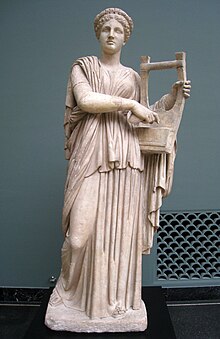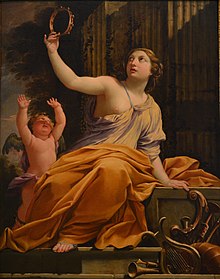| Erato | |
|---|---|
| Goddess of erotic and lyrical poetry | |
| Member of the Muses | |
 Roman statue of Erato (2nd century AD), playing the kithara or lyre Roman statue of Erato (2nd century AD), playing the kithara or lyre | |
| Abode | Mount Olympus |
| Symbols | Lyre, kithara |
| Genealogy | |
| Parents | Zeus and Mnemosyne |
| Siblings | Euterpe, Polyhymnia, Urania, Clio, Calliope, Thalia, Terpsichore, Melpomene and several paternal half-siblings |
| Consort | Malus (Μάλος) |
| Children | Cleophema |

In Greek mythology, Erato (/ˈɛrətoʊ/; Ancient Greek: Ἐρατώ) is one of the Greek Muses, the inspirational goddesses of literature, science, and the arts. The name would mean "desired" or "lovely", if derived from the same root as Eros, as Apollonius of Rhodes playfully suggested in the invocation to Erato that begins Book III of his Argonautica.
Function
Erato is the Muse of lyric poetry, particularly erotic poetry, and mimic imitation. In the Orphic hymn to the Muses, it is Erato who charms the sight. Since the Renaissance she has mostly been shown with a wreath of myrtle and roses, holding a lyre, or a small kithara, a musical instrument often associated with Apollo. In Simon Vouet's representations, two turtle-doves are eating seeds at her feet. She is sometimes depicted holding a golden arrow, symbolizing "eros", the feeling she inspires in everybody; at times she is accompanied by Eros, holding a torch.
Family
In Hesiod's genealogy, Erato is the daughter of Zeus and the Titaness Mnemosyne, and the sister to Calliope, Clio, Euterpe, Melpomene, Polyhymnia, Terpsichore, Thalia and Urania.
Her father gave Erato to Malus (eponym of Malea), as a bride and by him became the mother of Cleophema who bore Aegle (Coronis) by Phlegyas.
Development

Erato was named with the other muses in Hesiod's Theogony. She was also invoked at the beginning of a lost poem, Rhadine (Ῥαδινή), that was referred to and briefly quoted by Strabo. The love story of Rhadine made her supposed tomb on the island of Samos a pilgrimage site for star-crossed lovers in the time of Pausanias and Erato was linked again with love in Plato's Phaedrus; nevertheless, even in the third century BC, when Apollonius wrote, the Muses were not yet as inextricably linked to specific types of poetry as they became.
Erato is also invoked at the start of book 7 of Virgil's Aeneid, which marks the beginning of the second half or "Iliadic" section of the poem.
See also
Notes
- Apollonius Rhodius, Argonautica 3.1–5
- Cartwright, Mark (24 June 2012). "Kithara". World History Encyclopedia. Retrieved 15 April 2016.
- Hesiod, Theogony 53 ff., 78, 915 ff.; Apollodorus, 1.3.1; Diodorus Siculus, Bibliotheca historica 4.7.1
- Isyllus, Hymn to Asclepius 128.37 ff.
- In Geography 8.3.20; Strabo's attribution of the poem to Stesichorus was refuted by H. J. Rose, "Stesichoros and the Rhadine-Fragment", The Classical Quarterly 26.2 (April 1932), pp. 88–92.
- Pausanias, Graeciae Descriptio 7.5.13
- Plato, Phaedrus 259
- Richard Hunter, editor. Jason and the Golden Fleece (Oxford: Clarendon Press, 1993), p. 66 note.
References
- Pseudo-Apollodorus. The Library. Translated by Sir James George Frazer. 2 vols. Cambridge, Massachusetts: Harvard University Press; London: William Heinemann Ltd. 1921. ISBN 0-674-99135-4. Online version and Greek text at the Perseus Digital Library.
- Apollonius Rhodius, Argonautica. Translated by Robert Cooper Seaton. R. C. Loeb Classical Library Volume 1. London: William Heinemann. 1912. Online version at the Topos Text Project.
- Apollonius Rhodius Argonautica. George W. Mooney, ed. London. Longmans, Green. 1912. Greek text available at the Perseus Digital Library.
- Diodorus Siculus. The Library of History. Translated by Charles Henry Oldfather. 12 vols. Loeb Classical Library. Cambridge, Massachusetts: Harvard University Press; London: William Heinemann. 1989. Vol. 3. Books 4.59–8. Online version at Bill Thayer's web site at the University of Chicago.
- Diodorus Siculus. Bibliotheca Historica. Vol 1–2. Immanel Bekker, Ludwig Dindorf and Friedrich Vogel, eds. Leipzig: B. G. Teubner. 1888–1890. Greek text available at the Perseus Digital Library.
- Hesiod. Theogony. In The Homeric Hymns and Homerica with an English translation by Hugh G. Evelyn-White. Cambridge, Massachusetts: Harvard University Press; London: William Heinemann. 1914. Online version and Greek text at the Perseus Digital Library.
- Pausanias. Description of Greece. English translation by W. H. S. Jones. 4 vols. Cambridge, Massachusetts: Harvard University Press; London: William Heinemann. 1918. ISBN 0-674-99328-4. Online version at the Perseus Digital Library.
- Pausanias, Graeciae Descriptio. 3 vols. Leipzig: Teubner. 1903. Greek text available at the Perseus Digital Library.
- Strabo, The Geography of Strabo. Edition by H. L. Jones. Cambridge, Massachusetts: Harvard University Press; London: William Heinemann. 1924. Online version at the Perseus Digital Library.
- Strabo, Geographica, translated and edited by A. Meineke. Leipzig: Teubner. 1877. Greek text available at the Perseus Digital Library.
Further reading
- Van Aken, A. R. A. (1961). Elseviers Mythologische Encyclopedie. Amsterdam: Elsevier.
- Bartelink, G. J. M. (1988). Prisma van de mythologie. Utrecht: Het Spectrum.
- Cooper, J. C., ed. (1997). Brewer's Book of Myth and Legend. Oxford: Helicon.
- Lurker, Manfred (2004). Routledge Dictionary of Gods and Demons. London: Routledge.
External links
| Muses | |
|---|---|
| Nine Muses | |
| Other Muses | |
| Related |
|
| Ancient Greek deities | |||||||||||||
|---|---|---|---|---|---|---|---|---|---|---|---|---|---|
| Early deities | |||||||||||||
| Titans |
| ||||||||||||
| Olympian deities |
| ||||||||||||
| Water deities |
| ||||||||||||
| Personifications |
| ||||||||||||
| Other deities |
| ||||||||||||